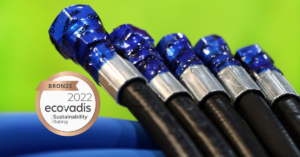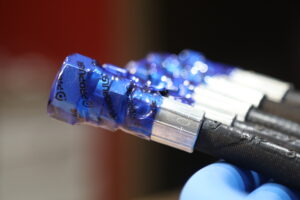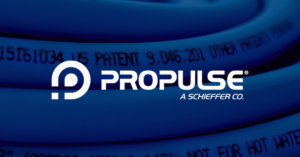Is that a rubber hydraulic hose? Nope! It's thermoplastic!
Rubber hydraulic hoses are a staple for many original equipment manufacturers (OEM’s), but there are alternatives to rubber that can offer significant advantages- like thermoplastic. Thermoplastic hose has been around for a while, and it often gets a bad wrap. But when it is engineered correctly, thermoplastic hydraulic hose can often outperform its rubber counterpart. Today it is hard to tell thermoplastic from rubber by its looks, touch, and flexibility. Technology has come a long way!
Take a look at the advantages thermoplastic hose provides compared to rubber.
How does thermoplastic hydraulic hose compare to rubber?
It has a tight bend radius with high flexibility.
Imagine a rubber hydraulic hose as a bread tie. The more the hose is twisted, flexed, and relaxed the more run down the wire (steel braid) gets. After a while, the wire breaks on the bread tie. This is similar to the steel braid reinforcement on a rubber hose; the steel braid gets worn down in places and breaks, causing a shortened life.
Even with repeated bending motion, the fibers in a thermoplastic hose will not weaken or crack like a wire braided rubber hose. This proves highly effective in flexing applications since thermoplastic can just continue to flex and power forward without fail. Tight routing applications can benefit from a more flexible hose.
Abrasion resistance.
Hoses are often under a lot of environmental pressures, including kinks, scratches, and many harsh applications. Any of these conditions can cause a rubber hose to expose the steel braid and eventually lead to premature failure. Thermoplastic hose is designed to be abrasion-resistant; its durability doesn’t allow for failure as rubber hoses do. The braid in a thermoplastic hose is integrated into the hose material, which provides the resistance to abrasion.

Unlimited shelf life and UV and ozone resistance.
Thermoplastic is extremely long-lasting in a variety of environmental conditions which would typically cause a rubber hose to degrade. In fact, per SAE guidelines the shelf life of a thermoplastic hose is considered to be unlimited.
Rubber hoses act like rubber car tires; UV accelerates the curing of the rubber compound which leads to cracking and exposure of the steel braid, and the hose ultimately fails. Since rubber never stops curing, and UV exposure only accelerates the curing process, the shelf life of rubber hoses is 10-years. Whereas thermoplastic hoses are made with Urethane, which is UV, Ozone, and Abrasion resistant and provide unlimited shelf life.
Long continuous lengths with lower contamination risk.
In rubber hose manufacturing, a mandrel is required. The hose length is limited by the mandrel length, and there can be contamination issues in the process. Contamination of the hose can create a ‘pinhole’ which can cause the hose to fail. At ProPulse, we manufacture our thermoplastic hoses without a mandrel and using all virgin material- never regrind. So, contamination is nearly nonexistent in our manufacturing process while being able to achieve very long continuous lengths of hose. This means less scrap and fewer reel changeovers during production for optimal cost efficiency.

Due to domestic production, Thermoplastic hose is often lower in cost compared to rubber hydraulic hose.
Many rubber hoses are made overseas, causing supply chain issues for U.S. OEM’s. ProPulse Thermoplastic hose is 100% manufactured in Peosta, Iowa. Since our manufacturing process is vertically integrated, our lead times and costs are lower than most overseas rubber hose suppliers.
Thermoplastic hose is 40 to 60% lighter compared to rubber hose.
Rubber hoses utilize steel braiding in the reinforcement of the hose. This can increase the weight of the hose and provide problems for certain OEM’s. Since thermoplastic hoses don’t use a steel braid, the components are lighter, which can be important for weight-sensitive applications such as over-the-road products.
ProPulse thermoplastic hoses are engineered to look and act like rubber- but better! We manufacture thermoplastic hoses in Peosta, Iowa for OEM’s who want shorter lead times, lower costs, and an unlimited shelf-life hose. Because we control the entire manufacturing process, we have more control over quality and can customize hoses to meet any specifications. Our state of the art assembly facility offers private branding, custom hose colors and personalized lay lines with enough volume.
We understand if you aren’t ready to make the switch yet, and if you still want rubber hydraulic hose, we can do that too!
ProPulse, A Schieffer Company is a Midwest hose manufacturer of thermoplastic hose. We service large distributors and OEM’s with our high-pressure hose applications. View our hose capabilities to learn more.
Recent Blog Posts by ProPulse:

ProPulse Receives Bronze EcoVadis Certification
ProPulse is proud to receive the Bronze Sustainability rating from EcoVadis for the second year in a row. What is EcoVadis? EcoVadis is the world’s

ProPulse Achieves Key Supplier Status with John Deere
ProPulse is proud to announce the achievement of Key Supplier Status from John Deere. The award confirms ProPulse’s strategic role in John Deere’s long-term strategy.

Silver Anniversary, Golden Manufacturer
Twenty-five years ago, Schieffer Co. International opened in Peosta with just six employees in a 12,000-square-foot facility. In the two and a half decades since, the hose manufacturer has changed its name and expanded exponentially. Now known as ProPulse, a Schieffer Company, it employs 130, utilizes 130,000 square feet of space, and is celebrating its silver anniversary in March. “25 years is a long time,” said Jeff Theis, President and CEO of ProPulse, “but I believe ‘blink of an eye’ is appropriate when describing our journey.”











